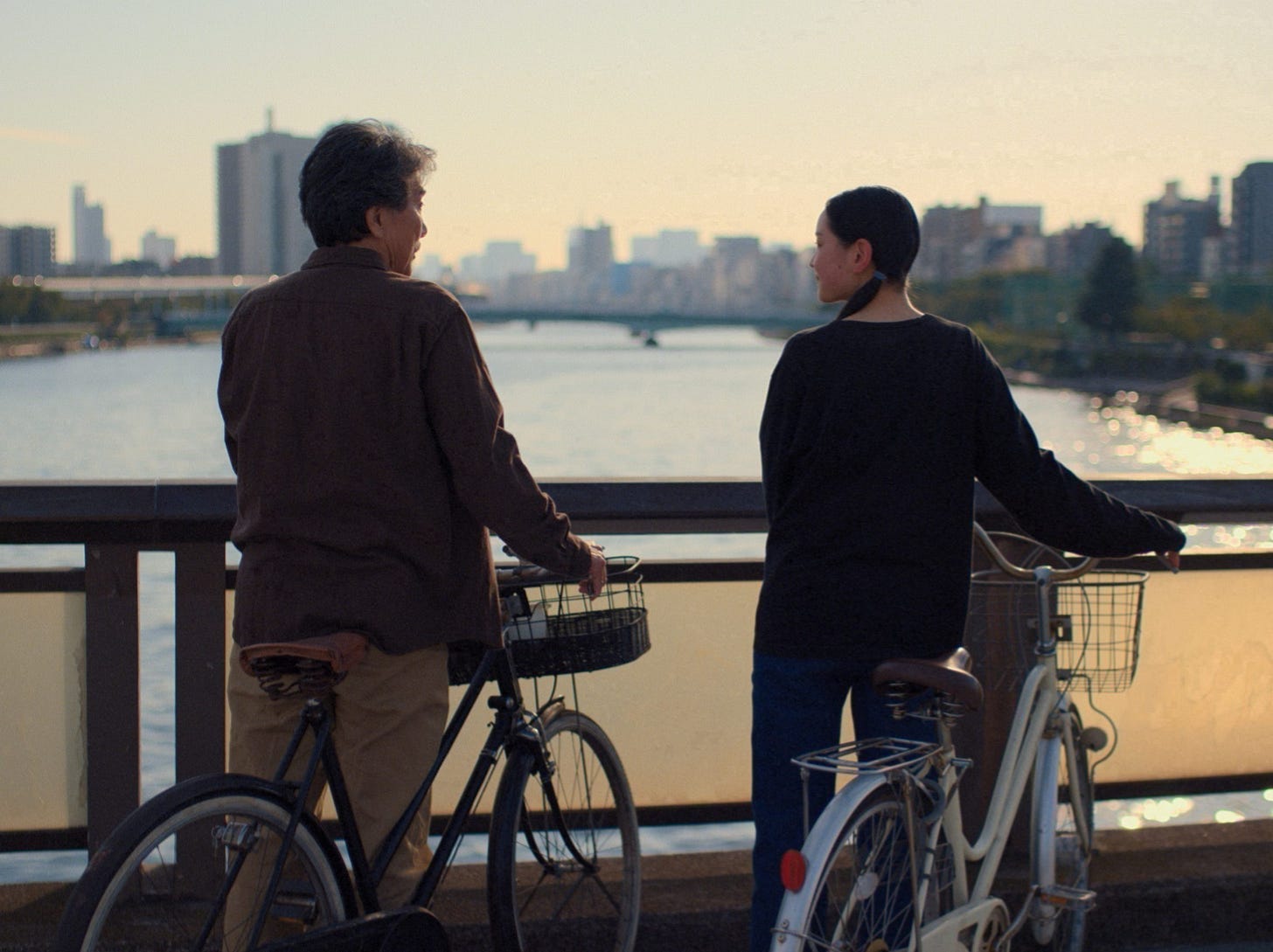What do you want for your life?
PERFECT DAYS encourages us to be in the moment - and step outside of our comfort zones
I gawked at the traffic.
Jeeps jockeyed for position... Trucks trundled along... Garishly decorated buses edged out an angry snarl of gridlocked cars, and motorbikes zipped through the chaos of it all. I was very glad I wasn’t the one behind the wheel of our taxi, but the driver seemed unfazed... Just another day on the road in Kathmandu, Nepal:
“The traffic in Tokyo is bad, but not like this,” my new friend observed.
I’d met her at the bus station, and when we’d realized that we were staying in the same neighborhood, we’d decided to join forces and share a ride.
“I’ve not been yet, but I imagine it’s more orderly in Tokyo?” I asked.
“It is,” she confirmed. “Actually it’s quite clean. Even the public toilets.”
“I just saw a film about that.”
“By Wim Wenders?” She glanced back at me from the front seat, curious.
“Yes,” I said, surprised. “Perfect Days. You know it?”
“I’m an entertainment writer in Tokyo.”
We spent the rest of the ride discussing the film. It felt great to meet someone who’d seen and appreciated it as much as I did.
A co-production between Japan and Germany, Perfect Days won Kōji Yakusho the award for Best Actor at Cannes last year, and it was nominated for Best International Feature at The Academy Awards - the first film directed by a non-Japanese filmmaker nominated as the Japanese entry. The story follows the life of Hirayama, a quietly charming man with a rich interior life who works as a public toilet cleaner in Tokyo.
When he’s not giving his all to sanitation - keeping designer toilet stalls spotless in the upscale Shibuya ward - Hirayama spends his time photographing trees, reading Faulkner, and listening to analog music cassettes. His life follows a gentle routine that defines the patient, peaceful rhythm of the film.
That rhythm is captured beautifully through the meticulous cinematography:
A nostalgic 4:3 aspect ratio combines with a remarkable specificity of the image to capture Hirayama’s appreciation of life’s simple pleasures, invoking the spirit of legendary Japanese director Yasujirō Ozu. “There was this heightened attention [in Ozu’s films] that looked at every object as if it only existed once and only there,” Wenders has said. “He was so attentive to every detail.”
One such detail - the film’s most significant visual motif - is how sunlight filters through trees, dappling everything it touches. Hirayama enjoys this transient play of light everywhere, from serene parks to glossy toilet awnings to the retreat of his nighttime dreams, which are rendered in impressionistic black-and-white.
There is a word for this beauty in Japan - Komorebi, which actually appears at the very end of the film: “The Japanese word for the shimmering of light and shadows that is created by leaves swaying in the wind. It only exists once, at that moment”.
Or as Hirayama says at one point, “Next time is next time. Now is now.”
He lives his life profoundly in the present, instead of trapped in his past or trying to predict the future. He seems to find pride and purpose in the simple fact of his existence in the world and in his ability to move through it.
I don’t want to pull us into the weeds of my personal life, but suffice it to say that when I pressed “play” on Perfect Days, I was hoping to hear back on something that was extremely important to me and completely outside of my control - the kind of thing you want and work toward, until eventually all you can do is wait for an outcome.
I was hoping so much for a specific outcome that I realized, as Perfect Days unfolded, that my desire was robbing me of my enjoyment of the film - effectively pronouncing its themes. The realization clicked with the movie like a puzzle piece.
Not to conflate cultures, but my mind went back to a silent meditation retreat I’d attended at a Buddhist temple in Thailand back in 2016… Sitting in a sunlight-dappled pavilion listening to a monk teach that desire is the source of our suffering.
That rings true for me, up to a point. It’s so easy to get swept up in a cycle of striving after something you want. But then I remembered the cafeteria during the retreat… The tasteless food that apparently was meant to inspire us to let go of the desire for a sensorily satisfying dinner experience. Honestly, that was a bridge too far for me.
Desire can lead to suffering, granted. I’ve experienced quite a bit of it this year.
But desire also can lead to beautiful things.
The heat of freshly steamed rice, the kick of fresh chili, the taste of perfectly seasoned vegetables… Big and small pleasures in the moment.
Does the suffering that desire causes outweigh the delight that desire can bring?
Regardless, “What do you want?” is the question that drives the narratives in so many movies because it’s the question that drives the narratives in so many of our lives.
Consciously or subconsciously, the reality is that it’s often at the wheel of our decision-making, opening us up to the full spectrum of human emotions: happiness and sadness, joy and despair; a wonderful, terrible range.
…Komorebi.
As we go about our days, emotions play in our hearts and on our faces like the leak of dappled sunlight. [Spoiler alert] This is exactly how Perfect Days ends - with an absolutely stunning shot of Hirayama driving to work, hit by the full force of his feelings that shift from moment to moment:
What starts as a film about the beauty of routine and mindfulness patiently expands outward to show how all of us suffer in one form or another, caught up in our wants.
Even Hirayama, despite how grounded in the present moment he strives to be.
[Spoiler alert] We see how the unexpected arrival of his niece brings Hirayama face-to-face with the brokenness of his family situation, suggesting that his simple life might actually be a way of running from his past.
An awkward reunion with his sister confronts him with how most of society, including his sister, views his humble occupation.
And by and large, Hirayama’s life is a solitary one that doesn’t leave much room for the messiness of other people. Most of his relationships are in the context of commerce… Colleagues, a restaurant proprietor with whom he has a special rapport, various shopkeepers. Such interactions can be pleasant, even refreshing - I experience many of them myself as a “nomad”, chatting with waiters, drivers, tour operators, etc. - but they tend to be shallow ones that don’t push boundaries.
So is Hirayama truly content?
Yes, the film suggests. But also - maybe - no.
Discussing Hirayama in Perfect Days, Wim Wenders tells us that “Everything he does, he does it because he wants to do it.” He charts his own course through life, regardless of other people’s expectations around what should bring him fulfillment.
But wants can change.
The film gives us flashes of what might happen if Hirayama were to take a leap of faith and open up to other people just a little bit more, pushing past his comfort zone. I think of the scene in which he befriends a dying man... They play shadow tag with joyful abandon, each a welcome source of comfort to the other during a difficult time.
Soon after our shared taxi ride, the entertainment writer and I got lunch at a local restaurant serving food from the Mustang region. When a Japanese tourist who’d joined us unexpectedly turned conversation to our respective love lives, I watched my new friend stiffen. “I’ve always been on my own,” she said to no one in particular.
She peered into her beer glass for a long time. “I prefer it that way.”
Sudden movement caught my eye. I looked past her then, at the far wall - a gust of wind shook the shadow of a tree, dancing in the light of the fading afternoon.
What do you want for your life? What would it look like for you to step outside of your comfort zone in pursuit of that goal?
I’d love to hear your thoughts in the comments!















I loved Perfect Days and your analysis makes me want to see it again. Great essay!
Interesting and provocative ideas there, Mike. Thanks for sharing!